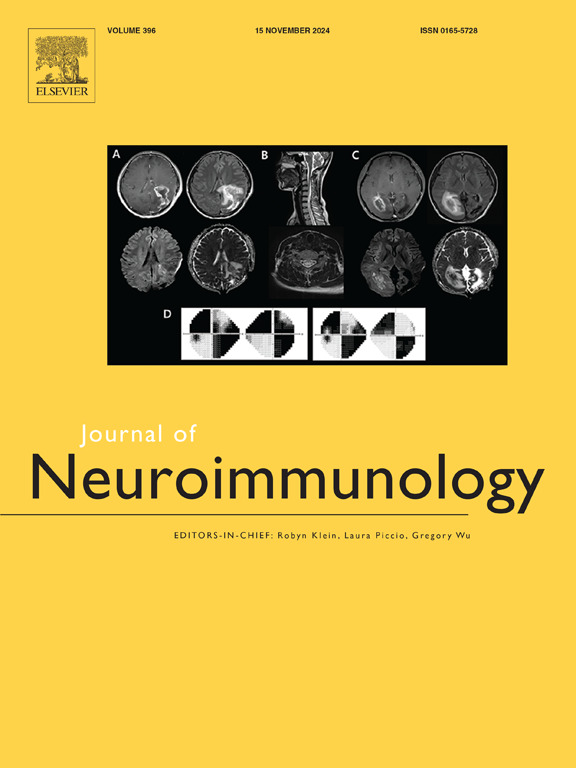Neuroprotective effects of Analgecine by modifying cholesterol metabolism in EAE mice model of multiple sclerosis
IF 2.5
4区 医学
Q3 IMMUNOLOGY
引用次数: 0
Abstract
Multiple sclerosis (MS) is a chronic autoimmune neurological disease characterized by inflammatory demyelination damage. Therapeutic alternatives for MS are still limited. Interventions to improve cholesterol homeostasis may be a viable approach to promoting the remyelination of MS patients. Analgecine (AGC), the extracts of Vaccinia-inoculated rabbit skin, is used in clinical for the treatment of low back pain. We previously found AGC had neuroprotective effect. In the present study, we aimed to discover the effect and mechanism of AGC on cholesterol homeostasis in a model of MS. In this study, we found that AGC effectively reduced the neurological deficit score and reversed the state of reduced body weight in the experimental autoimmune encephalomyelitis (EAE) mice. Furthermore, we also demonstrated that AGC treatment attenuated demyelination in the spinal cord and corpus callosum, amended loss of neurons in the hippocampal and cortical regions in EAE model. In addition, we identified the potential of AGC to well regulate cholesterol metabolism homeostasis by proteomic analysis, which may be related to its regulation of DHCR24 gene expression. Meanwhile, we also demonstrated in vitro and in vivo that AGC could effectively alleviate the abnormal cholesterol aggregation in microglia. Taken together, our study indicates that AGC is a promising potential agent for the treatment of MS by improving demyelination and neuron loss, which may be related to its ability in the regulation of cholesterol metabolism homeostasis.
安眠碱通过改变多发性硬化症EAE小鼠模型胆固醇代谢的神经保护作用
多发性硬化症(MS)是一种以炎性脱髓鞘损伤为特征的慢性自身免疫性神经系统疾病。多发性硬化症的治疗选择仍然有限。改善胆固醇稳态的干预措施可能是促进多发性硬化症患者髓鞘再生的可行方法。抗炎药(AGC)是牛痘接种兔皮肤的提取物,用于临床治疗腰痛。我们之前发现AGC具有神经保护作用。在本研究中,我们旨在发现AGC对ms模型胆固醇稳态的影响及其机制。在本研究中,我们发现AGC能有效降低实验性自身免疫性脑脊髓炎(EAE)小鼠的神经功能缺损评分,逆转体重减轻状态。此外,我们还证明,在EAE模型中,AGC治疗可以减轻脊髓和胼胝体的脱髓鞘,改善海马和皮质区神经元的损失。此外,我们通过蛋白质组学分析发现AGC具有良好调节胆固醇代谢稳态的潜力,这可能与其调节DHCR24基因表达有关。同时,我们在体外和体内也证明了AGC可以有效地缓解小胶质细胞中胆固醇的异常聚集。综上所述,我们的研究表明,AGC是一种很有前景的药物,可以通过改善脱髓鞘和神经元丢失来治疗MS,这可能与其调节胆固醇代谢稳态的能力有关。
本文章由计算机程序翻译,如有差异,请以英文原文为准。
求助全文
约1分钟内获得全文
求助全文
来源期刊

Journal of neuroimmunology
医学-免疫学
CiteScore
6.10
自引率
3.00%
发文量
154
审稿时长
37 days
期刊介绍:
The Journal of Neuroimmunology affords a forum for the publication of works applying immunologic methodology to the furtherance of the neurological sciences. Studies on all branches of the neurosciences, particularly fundamental and applied neurobiology, neurology, neuropathology, neurochemistry, neurovirology, neuroendocrinology, neuromuscular research, neuropharmacology and psychology, which involve either immunologic methodology (e.g. immunocytochemistry) or fundamental immunology (e.g. antibody and lymphocyte assays), are considered for publication.
 求助内容:
求助内容: 应助结果提醒方式:
应助结果提醒方式:


